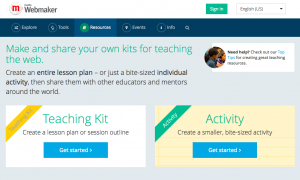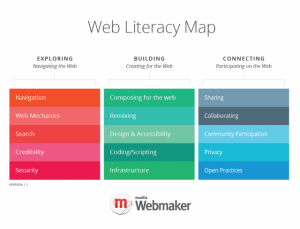Mozilla, maker of the web browser, Firefox, seems to be one of the leaders in the area of digital literacy. In addition to the discussion on the Literacy Map site, they also are providing tools to create lesson plans and classroom activities. Their goal for the resources are listed as:
- Make and share your own kits for teaching the web.Create an entire lesson plan – or just a bite-sized individual activity, then share them with other educators and mentors around the world.
Visit the site – https://webmaker.org/make-your-own

